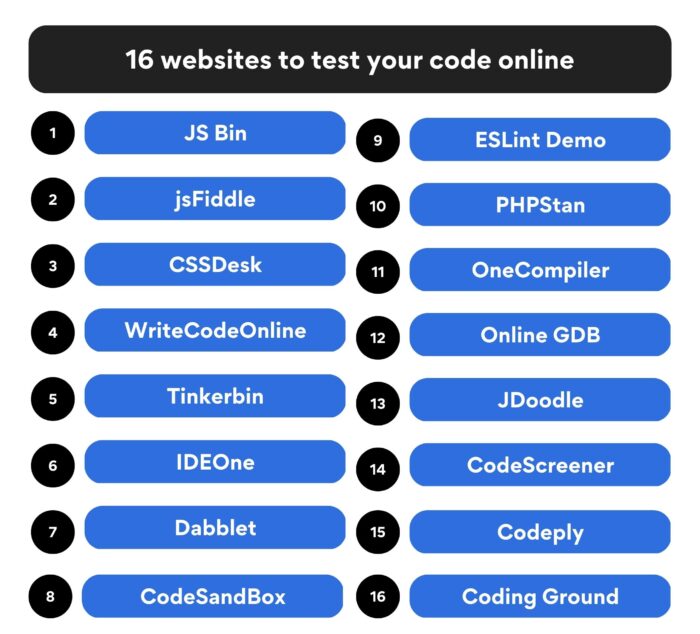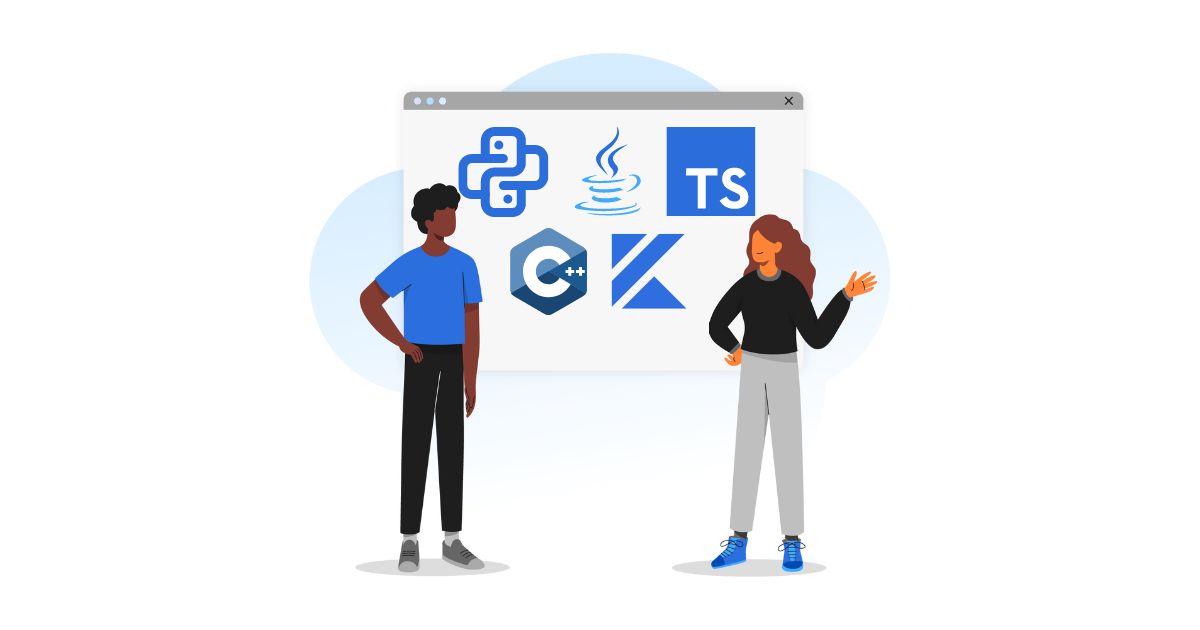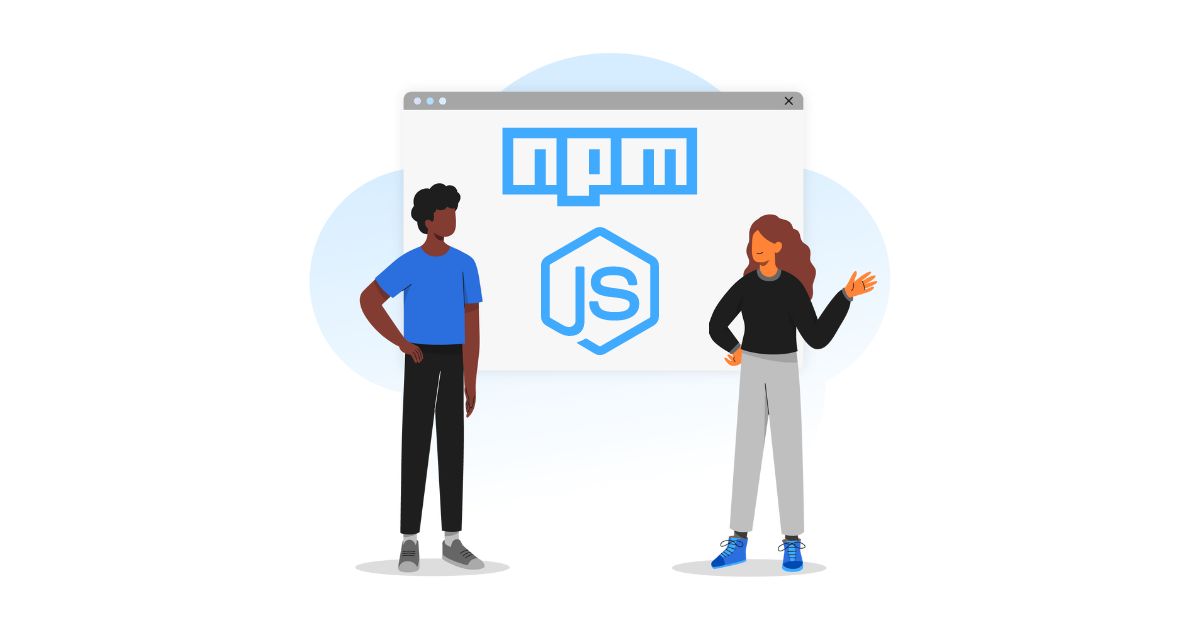16 Great Websites to Test Code Online in 2024
If you’re a developer, you know how important it is to test code online. All developers and programmers have a local server or an Integrated Development Environment (IDE) installed on their computers to test and execute programming codes. But what if you get a coding idea, and your computer isn’t nearby – What do you do then? Well, you find a web-based tool that can execute any code without downloading anything. Here is a list of 16 websites to check code online.
Note: All of these tools require an internet connection.
Top 16 tools to test code online

16 websites to test code online
-
Best tools to test code online – JS Bin
The first website on our list is JS Bin. JS Bin is a simple JavaScript debugging tool. Its key selling point is the ability to collaborate with other developers.
The tool allows you to share a private link with developers and write clean code alongside them in real time. Its user interface may seem a little strange at first, but it gets easier once you start working with the tool.
Pros:
- Live output preview which updates as you type.
- Allows for anonymous bins, which don’t require an account.
- Provides a console for JavaScript debugging.
- Supports pre-processors like Markdown, Jade, and SCSS.
Cons:
- No built-in collaboration feature for real-time code sharing.
- Limited to web technologies (HTML, CSS, JavaScript).
Pricing: Free, Pro version available at $12/month
-
jsFiddle
Loved by many developers worldwide, jsFiddle is a popular tool for testing codes for programmers and by many developers around the world. Compared to other web tools, it has a very dynamic interface and even supports complicated functions.
With jsFiddle, you can sign up for a free account and begin creating code right immediately, with no hassle. The website also provides a short URL that you can share with your friends on Twitter, Facebook, or other social media platforms.
Pros:
- Supports a wide range of JavaScript libraries and frameworks.
- Provides an option to include external resources.
- Allows for code tidying and JSHint validation.
- Collaboration feature for real-time code sharing.
Cons:
- The interface might be confusing for beginners.
- Limited to web technologies.
Pricing: Free
-
Best tools to test code online – CSSDesk
CSSDesk has a similar layout to the other apps on our list, with the source code on the left and the final render on the right. This software is ideal for building small web page models and testing lengthy CSS3 codes.
CSSDesk program also allows you to save the source code to your computer or generate a short, shareable link that allows other developers to contribute to your code.
Pros:
- Allows users to create collections of related code snippets.
- Provides an option to make code snippets private.
- Community voting system for popular code snippets.
- Supports embedding of code snippets on other websites.
Cons:
- Limited language support (HTML, CSS, JavaScript).
- No collaboration feature for real-time code sharing.
Pricing: Free -
WriteCodeOnline
WriteCodeOnline has a beautiful UI that is lighter than other options. With WriteCodeOnline, users can test codes written in JavaScript, PHP, and more. The tool displays the output results just beneath the text box.
As a result, when users hit execute code, the tool parses everything and shows the results. The website is not ideal for large files, but it’s an excellent way to put your fresh ideas to the test.Pros:
- Simple and straightforward interface.
- Real-time output for JavaScript and PHP.
- Provides a console for debugging.
- No sign-up required to use.
Cons:
- Very limited language support (JavaScript and PHP).
- No collaboration or sharing feature.
-
Best tools to test code online – Tinkerbin
Tinkerbin is a web application that allows you to experiment with HTML, JavaScript, and CSS without creating files or submitting them to a server. The application also supports CoffeeScript, Sass (with Compass), Less, HAML, and other languages. Its dashboard is pretty advanced and supports many of the same web design ideas that you’d expect to see in the future.Pros:
- Real-time output for HTML, CSS, and JavaScript.
- Supports pre-processors like HAML, LESS, and CoffeeScript.
- Provides a console for JavaScript debugging.
- No sign-up required to use.
Cons:
- Limited language support.
- No longer maintained, which may lead to outdated features.
Pricing: Free
-
IDEOne
IDEone is an online compiler and debugger that allows users to compile and run code in over 40 programming languages, including Objective-C, Java, C#, VB.NET, SQL, and many others.
You can also share this source code by storing it in a unique URL. However, the tool’s layout is packed with adverts and other materials, making it impossible to use their website freely. Aside from that, it’s a fun website to play on.Pros:
- Supports over 60 programming languages.
- Allows for saving and sharing of code.
- Provides a console for debugging.
- Offers an API for integration with other services.
Cons:
- No real-time output.
- The interface might be confusing for beginners.
Pricing: Free -
Best tools to test code online – Dabblet
Dabblet is an interactive app for quickly testing CSS and HTML code. Dabblet uses a prefix-free template so that users don’t have to add any prefixes to their CSS code. With Dabblet, users can save their work in GitHub gists, embed it in other websites, and share it with other users/customers.Pros:
- Real-time output for HTML, CSS, and JavaScript.
- Supports pre-processors like HAML, LESS, and SCSS.
- Allows for saving snippets on GitHub Gists.
- Provides a color picker for CSS.
Cons:
- Limited language support.
- No longer maintained, which may lead to outdated features.
Pricing: Free
-
CodeSandBox
CodeSandBox is a web-based code editor and prototyping tool that makes creating and sharing web apps easy. It’s a JavaScript editor with a lot of bells and whistles.
CodeSandBox supports all React.js, Vue.js, Svelte, and Node.js. NPM dependencies will be downloaded automatically by CodeSandbox. Another use for CodeSandBox is web-based terminal access. Also, read: 30 Most Popular NPM Packages for Node JS DevelopersPros:
- Supports a wide range of programming languages and frameworks.
- Provides a full-featured online IDE, not just a code editor.
- Allows for importing projects from GitHub.
- Collaboration feature for real-time code sharing.
Cons:
- The interface might be overwhelming for beginners.
- Some features are locked behind the Pro version.
Pricing: Free, Pro version available at $9/month -
Best tools to test code online – ESLint Demo
You can use ESLint to create writing rules for your code. It’s an excellent option if you’re working on a team project and want to make sure that everyone writes code in the same style and follows the same guidelines.
ESLint offers so many options for governing your code styles that picking one may be intimidating, especially if you’re just getting started with the tool.Pros:
- Useful for checking JavaScript code quality.
- Allows for customization of linting rules.
- Provides detailed explanations for linting errors.
- No sign-up required to use.
Cons:
- Limited to JavaScript
- No collaboration or sharing feature
Pricing: Free -
PHPStan
PHPStan is a PHP code static analysis tool that checks for faults and potential flaws without running the code. For example, the tool will notify you if you send a string value to a method that accepts an integer or if you try to access a property on a class that doesn’t exist.
Use the online editor on the PHPStan website to see how it works. You’ll be surprised to see how many existing PHP codes may be improved and fixed to eliminate potential issues.Pros:
- Useful for checking PHP code quality.
- Supports many PHP versions.
- Allows for customization of linting rules.
- Provides detailed explanations for linting errors.
Cons:
- Limited to PHP It is limited to PHP, and doesn’t support other languages.
- No real-time output.
Pricing: Free -
Best tools to test code online – OneCompiler
OneCompiler is a free online compiler tool. It helps you write, run and share code online in more than 60 programming languages, including in-demand programming languages such as Java, Python, MySQL, C, C++, NodeJS, Jshell & HTML. This tool is ideal for fast testing your code for a demo or running a short test.Pros:
- Supports over 50 programming languages.
- Allows for saving and sharing of code.
- Provides a console for debugging.
- Offers an API for integration with other services.
Cons:
- No real-time output.
- The interface might be confusing for beginners.
Pricing: Free
-
Online GDB
OnlineGDB is a free online compiler and debugger tool that supports several programming languages including C, C++, Java, Python, and PHP. It enables online code writing, compilation, and execution without the requirement for setup or installation. With features like syntax highlighting, code completion, and debugging tools like breakpoints and watchpoints, OnlineGDB offers a user-friendly interface. Additionally, it offers a console to show the code’s output, making it simple to test and debug code in real time. Developers may easily and effectively test their code online with OnlineGDB as a whole.
Pros:
- Supports many programming languages.
- Provides a full-featured online IDE, not just a code editor.
- Allows for debugging with breakpoints.
- Offers an API for integration with other services.
Cons:
- The interface might be confusing for beginners.
- No collaboration feature for real-time code sharing.
Pricing: Free
-
JDoodle
Programming languages, including C, C++, Java, Python, Ruby, Perl, and more, can be compiled and edited online using JDoodle. Without any setup or installation, it enables users to write, compile, and run code online. With features like code completion, syntax highlighting, and the option to share code, JDoodle offers a straightforward and user-friendly interface. It also offers a console to show the code’s output, making it simple to test and debug code in real-time. JDoodle is, all things considered, a helpful and effective solution for developers to quickly test and run code online.
Pros:
- Supports over 70 programming languages.
- Allows for saving and sharing of code.
- Provides a console for debugging.
- Offers an API for integration with other services.
Cons:
- No real-time output
- Limited collaboration feature
Pricing: Free, Premium version available at $5/month
-
CodeScreener
You may test, exchange, and assess code using CodeScreener. It is compatible with a wide range of programming languages, including C, C++, Java, Python, Ruby, and more. In addition to syntax highlighting, code completion, and debugging features like breakpoints and watchpoints, the website offers a code editor. Through the console, it is simple to execute your code and check for functionality. CodeScreener also makes it possible for you to distribute your code to others by creating a special URL that anyone may view.
What’s more, CodeScreener enables you to assess code by creating online exams with time constraints, specific input/output values, and multiple-choice questions. In conclusion, CodeScreener is a thorough online platform that streamlines the testing, sharing, and evaluation of code.Pros:
- Supports many programming languages.
- Useful for conducting coding interviews.
- Allows for recording of coding sessions.
- Provides detailed reports of coding sessions.
Cons:
- No real-time output
- Pricing information not readily available
Pricing: Contact for pricing -
Codeply
Developers may write, test, and share front-end web development code using a user-friendly interface on Codeply, an online playground for HTML, CSS, and JavaScript. It has features like live preview, code completion, and syntax highlighting and supports a number of frameworks, including Bootstrap and Foundation. Codeply makes it simple to cooperate with others by enabling developers to share their code via a specific URL. Teams working on web development projects can benefit from using it because it also has a Pro edition with advanced capabilities.
Pros:
- Supports many web technologies and frameworks.
- Real-time output.
- Allows for saving and sharing of code.
- Provides a responsive viewer to test different screen sizes.
Cons:
- The interface might be confusing for beginners.
- Some features are locked behind the Pro version.
Pricing: Free -
Coding Ground by TutorialsPoint
The online development environment Coding Ground by TutorialsPoint enables you to write code, generate programs, and run them online. It provides a range of domains, including C, C++, Java, Python, PHP, and others. The integrated editor allows you to test your code and has debugging tools like breakpoints and watchpoints, as well as syntax highlighting and code completion. A range of lessons and tools are also accessible on the internet, which you can utilize to advance your programming skills. In conclusion, Coding Ground by TutorialsPoint is a great tool for programmers of all experience levels who wish to sharpen their coding skills and experiment with different languages.
Pros:
- Supports many programming languages.
- Allows for saving and sharing of code.
- Provides a console for debugging.
- Offers an API for integration with other services.
Cons:
- No real-time output.
- The interface might be confusing for beginners.
Pricing: Free
Final thoughts
These code testing websites make it simple to work, run code online, and collaborate with other developers. But remember, though these tools can help you along the path to building your final product, they are not your actual, heavy-duty programming and testing tools. And thus, one should use these when they want to test their code’s capability on the go.
Remote developer job alert!
Are you looking for remote developer jobs? Well, hundreds of top US companies are waiting to hire you. What’s in it for you?
1. High salary
2. Flexible working hours
3. Fantastic career growth
Visit the Apply for Jobs page to get started!
FAQs
- Where can I test JavaScript code online?
You can test JavaScript code on a number of websites, including CodePen, JSFiddle, JS Bin, Repl.it, and PlayCode. These platforms offer an easy-to-use code editor for creating and testing JavaScript code, as well as a console to show the results. It is simple to test front-end web development code because they also support HTML and CSS. These websites are helpful for cooperation and exhibiting your work because they also let you store and share your code with others. Developers may quickly test and play with JavaScript code using these online tools without the need for a cumbersome setup or local development environments. - How can I test my code online?
Testing your code online is an efficient way to debug issues and experiment with new ideas without the need for a local development environment. Find a web-based code editor or development environment, like CodePen or JSFiddle, that supports your programming language to accomplish this. Run your code in the online environment using the built-in debugging and testing tools, or import it from a file. Till it performs as anticipated, make necessary adjustments and retest. Finally, save and distribute your code so that others can work with you or see your best work. - Where can I test my HTML code?
In a web browser like Safari, Firefox, or Chrome, you can test your HTML code. To see how it appears and works, simply create an HTML file and open it in a browser. You can also utilize online tools like CodePen, JSFiddle, and JS Bin, which let you write HTML, CSS, and JavaScript code in an easy-to-use editor and test it while viewing the results in real time. Repl.it and Coding Ground are two other online code editors that offer a web-based development environment for testing HTML code and other programming languages.
Join a network of the world's best developers and get long-term remote software jobs with better compensation and career growth.












